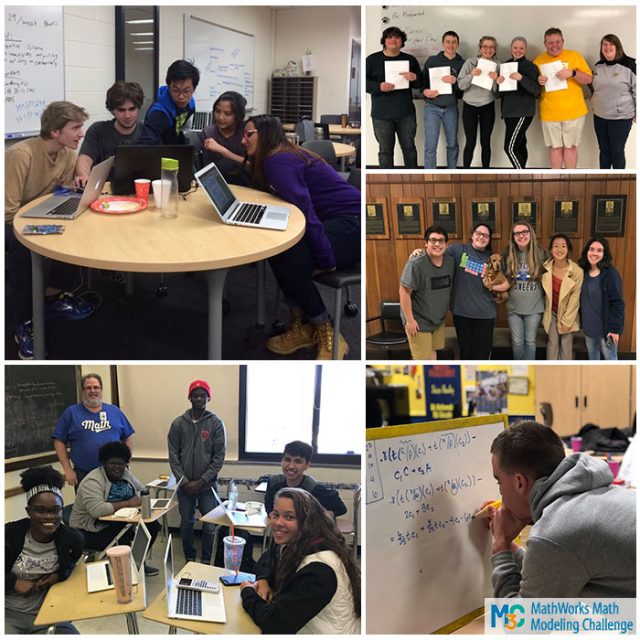Mathematics comes in handy for answering questions about a variety of topics, from calculating the cost-effectiveness of fuel sources and determining the best regions to build high-speed rail to predicting the spread of disease and assessing costs and benefits of repurposing squandered food. Seeing the value and usefulness of applying math to problems in the world is a huge take-away for participants in MathWorks Math Modeling (M3) Challenge.
“Participating in M3 Challenge opened my eyes to fields in applied math that I didn’t know about before. It allowed me to consider new career possibilities and helped me to work well within a team and under pressure. It’s unlike anything I’ve ever done before,” says Eric Chai, member of the 2019 champion team from High Technology High School in New Jersey. “Another teammate and I did the Challenge both years that we were eligible. That just shows how valuable we think it is. It allows us to do what we love–math and STEM–and apply it to a real-world competition. Winning recognizes our effort and it means a lot.”
M3 Challenge is an annual applied math modeling competition that encourages the use of online collaboration tools and resources. A program of Society for Industrial and Applied Mathematics (SIAM) that is funded by leading technical computing software developer MathWorks, M3 Challenge motivates students to study and pursue careers in applied mathematics, computational science, and technical computing. It has been a virtual competition since its inception in 2006.
An opportunity your math students won’t miss out on this year
While many extracurricular activities are being cancelled due to the inability to hold them safely, M3 Challenge is one competition that promises not to disappoint. It’s virtual, free, and is awarding £75,000+ in scholarships to talented math students in the UK and United States! Registration is open until February 19.
“SIAM does a big service to the math community by giving students the opportunity to see how math is more than just a series of formulas and rote memorization,” says Dr. Karen Bliss, director of M3 judging and associate professor of applied mathematics at Virginia Military Institute in Lexington, Virginia. “M3 Challenge allows students to produce highly creative solutions to interesting problems, and to see that math can be a powerful tool for solving truly important problems. Sometimes their participation in the competition is enough to encourage them to study math or another STEM discipline at university.”
David Stein is a teacher at Montgomery Blair High School in Silver Springs, Maryland who has coached multiple finalist teams in M3 Challenge. When asked how teachers can influence students to study and pursue STEM careers, demonstrate the interdisciplinary nature of the studies, and see the impact that working with math and science can have on the students, their communities, and the world, he suggested the following: 1) base rigorous lessons on real-world issues and problems; 2) focus students’ attention on communication and writing; and 3) provide opportunities like M3 Challenge for them to showcase their work.

Challenge weekend is February 26 through March 1, 2021—students choose their 14-hour stretch
Working in small teams for 14 consecutive hours during Challenge weekend, students devise a solution to a real-world problem using mathematical modeling. Of the hundreds of participating teams, up to nine will be selected as finalists, and will share a large portion of the more than $100,000 (~£79,000) in scholarship prizes available (there are 37 monetary prizes total). Finalist teams are invited to an all-expense paid trip to New York City for the final event, which is scheduled for April 26, 2021. The top-ranking team in all of England and Wales will be invited to participate in the final event, all expenses paid, regardless of their overall ranking. (Disclaimer: COVID-19 implications are likely to cause this event to become virtual.)
“One thing that surprised me a lot about M3 Challenge is the amount of thinking involved,” says Jonathan Zhang, a student at White Station High School in Memphis, Tennessee, whose team was a 2020 Runner-Up. “Throughout the day, we were constantly running into obstacles when trying to create models for each problem, but within 14 hours, we were able to transform our abstract ideas into statistically backed predictions that made sense.”
A contest with lasting impact
M3 Challenge has had a profound impact on many of its participants, including Dr. Chris Musco, a 2008 M3 Challenge finalist who is now head of the competition’s technical computing judging and a member of the problem development committee. “Being involved in this program as a judge and using my experience and perspective to help shape the problem the students will work on is really exciting,” says Musco, assistant professor in the Tandon School of Engineering at New York University. “M3 Challenge changed the trajectory of my college major and career, and it’s great to play a part in doing that for the students who are participating now.”
Intense judging—and constructive feedback to teams on their work
Submissions are judged by an international panel of 150 primarily Ph.D.-level mathematicians, and almost every team receives specific feedback on their submission from the judges who read their papers during rigorous assessments.
Judges look forward to seeing creative, outside the box approaches to predicting, quantifying, and/or providing insight into the Challenge problem, which is unknown until teams download it on Challenge weekend. “The questions can be approached in a variety of ways depending on students’ skills and experiences,” says problem development committee member and judge Dr. Katie Kavanagh of Clarkson University in Potsdam, New York. “For example, participants may use simulation and programming, probability and statistics, or even algebra and basic math to model aspects of the open-ended problem. We are always eager to see how the students approach the issue,” says Kavanagh. “They offer unique perspectives on what factors are important to consider, particularly at that critical, transitional time in their own lives and influenced by their unique circumstances.”
Past competition topics have had students address issues such as the transition of trucking from diesel to electric, substance abuse, food insecurity, plastic recycling, and car sharing.
Learn more and register
Interested students, teachers, and parents can review how the contest works, the rules, and see some great ways to prepare for success using free resources and sample problems at M3Challenge.siam.org.
“Every year without fail, we hear from students who refer to their participation in M3 Challenge as a transformative experience that helped open their eyes to how important, useful, and valuable the application of mathematics can be,” said Michelle Montgomery, M3 Challenge program director at SIAM. “I am confident that this year’s Challenge will do the same.”
Since 2006, M3 Challenge has awarded more than $1.5 million in scholarships.
Registration is open until February 19, 2021. The competition will take place February 26 to March 1, 2021. For more information and to register, visit http://m3challenge.siam.org.

















Your thoughts